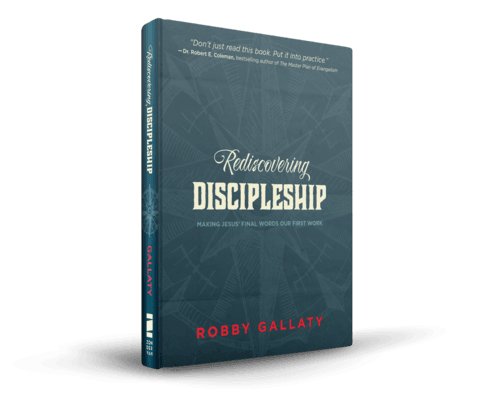⏱️ Estimated Reading Time: 4 min read
If you look up the definition of “mixed bag” in the dictionary, it’s possible you may see a picture of a bag of books on discipleship. You truly never know what you’re going to get when you pick up a book on how to do effective discipleship. Some books are heavy on principles with little theology, some are the opposite. Some are really advanced and lofty, some are painfully simplistic and near-boring.
I have to be honest at this point. When I picked up Robby Gallaty’s new book, “Rediscovering Discipleship,” I was wary and cautious for these reasons. And any time someone boasts they have a plan to “rediscover” or “reorient” right thinking, they’re making quite a bold claim. I didn’t know what to expect in Gallaty’s book, and was hoping to not be disappointed. Fortunately, I was surprised, shocked even, by how good this book was. This book gives me hope that authors should continue to take stabs at this ever-present question of how to be disciples and disciple-makers.
A lot of books on this topic, I’ve found, are flimsy in theology and merely want to share their church’s plan for disciple-making. Gallaty says little about his former church, Brainerd Baptist, right until the end of the book. For over ten chapters, the focus is on the theology of discipleship. I am really appreciative of that. Gallaty does a wonderful job of mixing the why of discipleship with the how of discipleship.
There were a few chapters from the first half of the book that really stuck out to me. One in particular was Chapter 5, where Gallaty talks at length about the discipleship practices and philosophies of Augustine, Martin Luther, William Tyndale, Thomas Cranmer, Richard Baxter, and Jonathan Edwards. Such great insight is here, and Gallaty’s turn to the past for counsel is a rare find in books like these. Often, we’re so enveloped with new methodologies, new processes, new improvements, we miss the time-tested practices that have worked for centuries.
In fact, in Chapter 6, Gallaty turns to the ideology we can learn from the great disciple-maker John Wesley and how his ministry can be applied to today’s context. Gallaty’s glimpse into the life of this great Methodist preacher was riveting reading. Wesley is widely regarded as a preacher, but in reality he was an extraordinary organizer and passionate disciple-maker. Gallaty’s slow walk through the life of Wesley really helps demonstrate the model for discipleship he is advocating for. I definitely appreciated the high-theological approach to uncovering the why in our quest to make disciples throughout this book.
There were some great specific take-aways I gained from this book. One was seeing how much more important and critical group discipleship is than individual discipleship. I’ve always advocated for the group setting, but I didn’t have language for why it was just as, if not more, essential than one-on-one discipleship opportunity. Here he elaborates:
Mathetes, the word most commonly translated as “disciple” in the New Testament, is used 239 times in the plural form in the Gospels and the book of Acts. That same word is used only twenty-five times in the singular form…There is only one time in the entire Bible when the singular word disciple is used to describe an individual…The disciples of Jesus understood that discipleship happens in community, as a group. (144)
Another great take-away was in Chapter 7 where Gallaty does some masterful exposition of Ephesians 4:11–13 to show the pastorate as a role of equipping the saints for the work of ministry as opposed to doing the ministry for them. This is both encouraging and challenging stuff for pastors and church leaders to consider. How are we discipling our congregations in terms of equipping them? Are we doing all the work for them because we’re overbearing, or even because we’re pushovers? This is good reflection Gallaty invites us to participate in.
Overall, I am pleased to recommend this book and would specifically encourage those desiring to start/join a small group to consider reading this book. Recovering Discipleship will help us frame the purposes of discipleship into the context of Scripture, for God’s glory and our flourishing. I would also petition pastors and church leaders to pick this book up. This is a great way to center your church’s discipleship strategies on the right stuff. This book isn’t about creating a McChristianized, “quantity over quality,” formula for success. This book will encourage you to slow down, consider the Word, pray for the Spirit to move, be faithful and patient with what you have, and pursue souls for the sake of God-glorifying, transformational change.
I received this book from Zondervan in exchange for my honest review.




